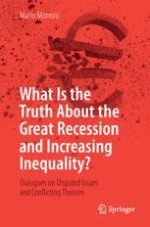2018 | OriginalPaper | Chapter
The Failure to Predict the Great Recession
Second Dialogue
Author : Mario Morroni
Published in: What Is the Truth About the Great Recession and Increasing Inequality?
Publisher: Springer International Publishing
Activate our intelligent search to find suitable subject content or patents.
Select sections of text to find matching patents with Artificial Intelligence. powered by
Select sections of text to find additional relevant content using AI-assisted search. powered by
